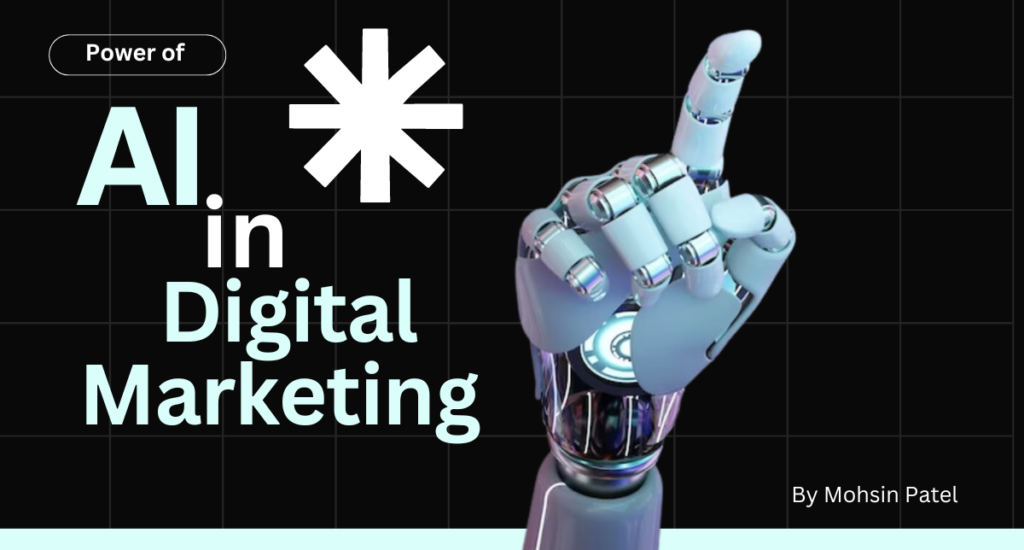
In today’s digital world, businesses are constantly evolving to keep up with the growing demands of their customers. As consumers expect more personalized experiences, faster responses, and seamless interactions, the pressure on marketers to deliver has never been greater. This is where artificial intelligence (AI) steps in, making a huge impact in how companies market their products and services.
AI in digital marketing and automation are no longer just buzzwords in the tech world—they are transforming the digital marketing landscape. Whether it’s through personalized ads, chatbots, or automated email campaigns, AI allows businesses to do more with less. In this article, we’ll dive into how AI is revolutionizing digital marketing and, more importantly, how it can help businesses create meaningful connections with their audiences.
Table of Contents
1. AI in Digital Marketing: What’s Happening?
Let’s start with the basics. AI in digital marketing is all about using advanced algorithms to analyze data, predict behavior, and automate tasks that typically required manual effort. It’s like having an extra set of hands (or a thousand!) to handle everything from data analysis to customer service, freeing up marketers to focus on the creative and strategic elements of their campaigns.
The beauty of AI is that it can process an enormous amount of data quickly and efficiently, allowing businesses to offer personalized experiences on a much larger scale. Gone are the days of mass-marketing one-size-fits-all messages. Now, AI helps brands deliver the right message to the right person at the right time, improving engagement and, ultimately, driving sales.
2. Personalization: More Than Just a Buzzword
We’ve all experienced it: you’re browsing a website, and suddenly, the perfect product appears, seemingly knowing exactly what you were looking for. That’s no coincidence—it’s AI in action.
AI allows marketers to create highly personalized experiences for customers by analyzing their browsing habits, purchase history, and even social media behavior. This type of personalized marketing used to be a manual, time-consuming task, but AI takes care of it in real-time, offering recommendations or tailored messaging based on individual preferences.
Take Netflix, for example. The platform uses AI to recommend shows and movies based on what you’ve previously watched, and it’s scarily accurate. Amazon does the same with its product recommendations. For businesses, this level of personalization is invaluable because it not only increases engagement but also makes customers feel understood and valued—something that is essential for building long-term relationships.
3. Data-Driven Decision Making: The New Normal
In the digital age, data is everything. But the challenge isn’t gathering the data—it’s knowing what to do with it. That’s where AI truly shines.
Marketers today are bombarded with metrics, from web traffic and click-through rates to conversion rates and social media engagement. Sifting through all of this data manually is like finding a needle in a haystack. AI tools can analyze this data quickly, pulling out valuable insights that help marketers make smarter decisions.
For example, AI can help predict future trends based on current customer behavior, allowing businesses to be proactive rather than reactive. Tools like Google Analytics 4 use machine learning to offer predictive insights, which help marketers optimize their campaigns in real-time. This isn’t just about saving time—it’s about making better decisions that lead to better results.
4. Automating Ad Bidding: Smarter Spending
Running digital ad campaigns can be time-consuming and expensive, especially if you’re constantly adjusting bids to optimize performance. Enter AI.
Many advertising platforms, like Google Ads and Facebook Ads, use AI to automate the bidding process. Essentially, AI algorithms analyze user behavior and adjust bids in real-time, ensuring that you’re targeting the right audience at the right price.
This means businesses can get more value out of their advertising budget without constantly monitoring and adjusting bids. And the best part? These systems are designed to continuously learn and improve, making your campaigns more effective over time. It’s like having a personal marketing assistant that’s always working to get you the best deal.
5. AI Tools That Are Changing the Game
So, how can businesses start using AI in their marketing strategies? Luckily, there’s no shortage of tools available. Here are a few of the most popular ones:
- HubSpot: HubSpot uses AI to automate email marketing, manage customer interactions, and personalize content.
- Google Analytics 4: This tool leverages machine learning to help marketers understand customer behavior and improve website performance.
- Mailchimp: Known for its email marketing capabilities, Mailchimp uses AI to help businesses segment audiences, automate A/B testing, and personalize email campaigns.
These tools are designed to help businesses streamline their marketing efforts, making it easier to reach the right audience with the right message—without all the manual labor.
6. Social Media and AI: A Match Made in Heaven
If there’s one area where AI is making a massive impact, it’s social media marketing. In an environment where brands are competing for attention, AI tools are helping businesses stand out by making their social media efforts more strategic and efficient.
One of the biggest challenges in social media marketing is managing multiple platforms and posting consistently. AI-powered tools like Hootsuite and Buffer take the guesswork out of scheduling by analyzing past performance and recommending the best times to post for maximum engagement.
AI also plays a significant role in social listening—tracking what people are saying about your brand across various platforms. By analyzing sentiment and customer feedback in real-time, marketers can adjust their strategies on the fly, making sure they’re always in tune with their audience’s needs.
7. Chatbots: Revolutionizing Customer Engagement
We’ve all interacted with chatbots at some point, whether we realized it or not. What started as simple, rule-based systems has evolved into highly sophisticated AI-driven tools that can carry out complex conversations and assist customers in real-time.
For businesses, this is a game-changer. AI chatbots can handle common customer service inquiries, freeing up human agents to focus on more complex issues. They can also help with lead generation, guiding potential customers through the sales funnel and even closing sales.
The best part? AI chatbots are available 24/7, offering customers instant support whenever they need it. This not only improves customer satisfaction but also boosts brand loyalty.
8. AI in SEO and Content Creation
Search engine optimization (SEO) is one of the most critical components of digital marketing, and AI is helping businesses stay competitive by automating much of the process. Tools like SurferSEO analyze top-ranking content and provide recommendations on how to optimize your website for better search engine results.
AI is also making waves in content creation. While human creativity will always be essential, AI tools like Jasper and ChatGPT can assist with everything from brainstorming blog ideas to writing social media captions, making the content creation process faster and more efficient.
9. Real-World Success Stories
There’s no shortage of examples of businesses successfully using AI to improve their digital marketing efforts. Spotify uses AI to curate personalized playlists for its users, leading to higher engagement and customer retention. Coca-Cola uses AI to analyze consumer data and create targeted marketing campaigns that resonate with specific demographics.
Even small businesses are benefiting from AI. A local clothing store using Mailchimp’s AI-powered email marketing saw a 30% increase in sales by automating their campaigns and personalizing their messaging.
10. Finding the Balance: AI and the Human Touch
While AI can do a lot, it’s important to remember that it’s not a replacement for human creativity and intuition. The most successful marketing campaigns are those that strike a balance between automation and human input. AI should be seen as a tool to enhance, not replace, human effort.
At the end of the day, marketing is about creating genuine connections with people, and while AI can help us get there faster, the human touch will always be the heart of any great campaign.
Conclusion
AI and automation are transforming digital marketing in ways that we couldn’t have imagined just a few years ago. By leveraging AI, businesses can run more efficient and personalized campaigns, make data-driven decisions, and save time on repetitive tasks.
But it’s not about jumping on the AI bandwagon for the sake of it—it’s about using these tools strategically to build stronger relationships with your audience. As AI technology continues to evolve, the opportunities for marketers will only expand, making it an exciting time to embrace the future of digital marketing.
you can explore more about blogging and wordpress also on this site…
